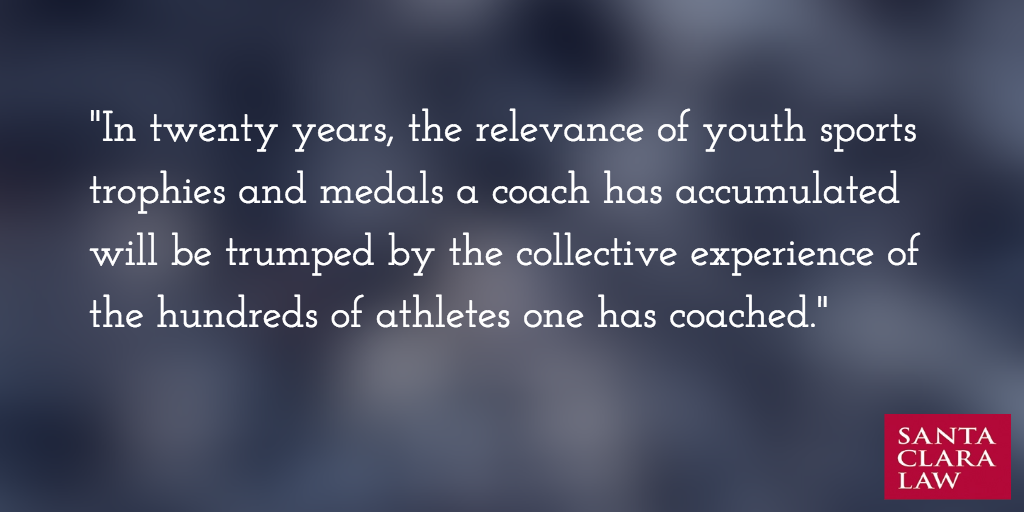
There seems to have been a considerable increase in morally vacuous incidents at the youth sports level recently. The incidents include everything from coaches’ poor treatment of their own players to how coaches instruct their athletes to treat opponents and referees, and countless others.
As is the case with teaching—for what is coaching if not teaching?—evaluating coaches proves to be rather difficult. On top of that, coaching is extremely difficult to do well, even for the most earnest of coaches.
I recently completed my school’s quadrennial evaluation process. That, combined with a few other recent instances in my own coaching life, caused me to reflect quite a bit on this process. In doing so, I would like to proffer an approach to help inform the proactive side of things, thus creating a foundational approach for youth sports coaches. In addition, this foundation will also help inform the evaluative component, though won’t be terribly useful to institutions… until twenty years later.
I call it the Twenty Year Rule for Youth Sports Coaches:
Coach as though your athletes will evaluate you not at the end of the season, nor upon graduation, but 20 years later.
This “Twenty Year Rule” would have been especially helpful in the various recent cases of poor high school coach conduct, such as the coach who instructed his football players to target a referee or the basketball coach who directed his players to inbound the ball directly an opponent’s face. High school athletes will willingly perform such clearly unethical actions often without truly recognizing what they’re doing, even viewing such actions as “cool.” Likewise, it’s easy for a coach to lose sight of what’s important amidst the heat of a competitive contest. But had these coaches wondered, “How will my athletes view this in twenty years?” it’s likely they’d recognize how morally lacking such directives were.
Children are often pegged as “smarter than we give them credit for.” Understanding this truism should help a coach in how he treats his players on a daily basis. But, they are also children: with not yet fully-formed brains and reliant on authority figures for guidance, they don’t quite yet see the forest from the trees. They can be easily manipulated and steered down the wrong path, or, more ideally, can be motivated to achieve greatness.
While this rule cannot function as a proper evaluative tool—no institution can wait 20 years to evaluate a coach—it can serve as a helpful check-in for a youth sports coach. When doing anything from the grandiose, such as devising a season’s schedule or a weight training program, to the seemingly mundane, such as discussing a player’s late arrival to practice, a coach can ask himself: “How will this player reflect on my treatment of him twenty years from now?”
Much like a child can’t truly recognize the real fruits of their own parents’ parenting until they reach deep into adulthood, we might consider this same approach as coaches. Once an athlete is twenty years removed, they can recognize the richness of the educational experience. They realize the myriad nuances involved in adults motivating children to do what’s often uninteresting to them at the time, but in their best interests overall. Twenty years out, wisdom sets in. You can look back and know you were treated respectfully (or not) by your coach, your best interests were taken to heart and that you’re a considerably better person for having been a part of the program.
I’ve had the chance to do this recently as my own high school coach—from over twenty years ago—recently retired, after 33 years and 715 wins. But it’s not the wins I judge now. In fact, what I and countless others reflect on is best summarized by him in a recent interview regarding his retirement: “I am absolutely overwhelmed by the men who have come through our program, truly defining the meaning of ‘Commitment,’ ‘Accomplishment,’ Success,’ and ‘Humility.’” These virtues were being instilled in us at a young age, relatively unbeknown to us: twenty years later, though, it’s easy to recognize and truly appreciate.

Along the trajectory of poorly-run youth sports organizations, kids may be chewed up and spit out by a program. This often goes completely unnoticed, especially in a winning program. As the old saying goes, “Winning is the best deodorant.” The young athletes don’t recognize it at the time, and how could they? It’s all they know. But they will see it clearly, for good or for bad, two decades later. In twenty years, the relevance of youth sports trophies and medals a coach has accumulated will be trumped by the collective experience of the hundreds of athletes one has coached.
To revisit the parenting analogy, twenty years after leaving home, children realize what their parents were really doing all along during their upbringing. The work it took for my parents to instill good eating habits, study skills, sleep patterns, and overall character wasn’t easy—I know now more than ever as it often takes my wife and I a full hour of active work to get our young children from the dinner table into bed, not to mention teaching them impulse control.
Being a good parent and being a good coach doesn’t involve being the child’s and athlete’s friend. It involves something much greater. A coach who recognizes this can do their job more effectively, and may just have to wait twenty years for the real evaluations to come in.